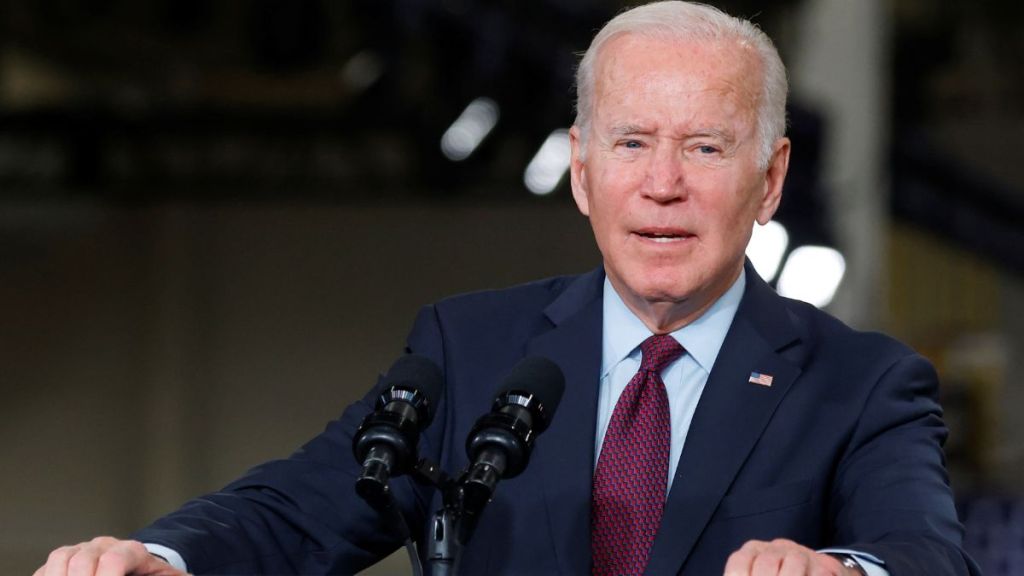US President Joe Biden described a three-phase proposal made by Israel to Hamas militants on Friday, saying it would result in the release of the remaining hostages in Gaza and potentially bring an end to the gruelling, almost 8-month-old Mideast conflict, news agency AP reported.
President Biden also said that Hamas is “no longer capable” of carrying out another large-scale attack on Israel. He urged Israelis and Hamas to come to a deal to release the remaining hostages for an extended cease-fire.
In remarks from the White House, the Democratic president described the idea as “a road map to an enduring cease-fire and the release of all hostages”.
Three Phases: Hostage release, troop withdrawal, reconstruction
President Biden announced that the initial phase of the proposed deal would last six weeks, featuring a “full and complete cease-fire,” the withdrawal of Israeli forces from all densely populated areas of Gaza, and the release of several hostages, including women, the elderly, and the wounded, in exchange for the release of hundreds of Palestinian prisoners.
During this phase, American hostages would be freed, and the remains of deceased hostages would be returned to their families. Humanitarian aid would increase significantly, with 600 trucks allowed into Gaza daily.
The second phase would involve the release of all remaining living hostages, including male soldiers, and the withdrawal of Israeli forces from Gaza. Biden stated that if Hamas fulfills its commitments, the temporary cease-fire could become a permanent cessation of hostilities, according to the Israeli proposal, AP reported.
The third phase would initiate significant reconstruction efforts in Gaza, which faces extensive rebuilding due to the war’s destruction. The 4.5-page Israeli proposal was sent to Hamas on Thursday.
Invitation to Netanyahu
Congressional leaders invited Israeli Prime Minister Benjamin Netanyahu to address the US Capitol. The invitation, from House Speaker Mike Johnson and Senate Majority Leader Chuck Schumer, has been planned for some time, though there is considerable concern, especially among Democrats, about Israel’s war strategy. No date for the speech has been set.
Challenges and Israeli Military actions
Biden acknowledged the challenges in keeping the Israeli proposal on track, noting many “details to negotiate” to transition from the first to the second phase. A significant obstacle in the first phase is reaching an agreement on the ratio of hostages to prisoners to be released, AP reported.
Biden’s comments followed the Israeli military’s confirmation that its forces are now operating in central Rafah as part of their expanded offensive in southern Gaza. Biden called it “a truly decisive moment” and said that Hamas has expressed a desire for a cease-fire, presenting an opportunity to demonstrate their sincerity.
Despite Biden’s push for an end to the war and a new beginning, Israeli officials remain committed to the military defeat of Hamas. Biden, facing a tough reelection campaign, has encountered criticism from some political left members who want him to pressure Netanyahu’s government to end the war.
Netanyahu’s response
Netanyahu’s office, in a statement following Biden’s speech, said he authorized Israel’s hostage negotiation team to secure the release of remaining hostages. However, Israel maintains that the war will not end until all its goals are achieved, including the return of all abductees and the elimination of Hamas’ military and governmental capabilities. The prime minister’s office also called for adherence to Israel’s proposed outline.
Analysts, Hamas react
Matt Duss, executive vice president for the Centre for International Policy in Washington, suggested that Netanyahu’s reaction indicated a potential difference between an acceptable Israeli proposal and what Biden outlined.
Hamas responded positively to Biden’s proposal, urging Israel to commit explicitly to a permanent ceasefire, complete troop withdrawal from Gaza, and a prisoner exchange, among other conditions. Israel has faced increasing international criticism for its strategy in Gaza, which has resulted in significant civilian casualties. According to Gaza’s Health Ministry, Israeli bombardments and ground offensives have killed over 36,000 Palestinians.
Biden also addressed those in Israel who oppose ending the war, noting that some members of Netanyahu’s far-right coalition want to continue fighting and do not prioritize the hostages. He urged Israeli leadership to support the deal.
Biden did not mention Palestinian statehood in his remarks, although he has previously emphasized its importance for long-term peace in the region. The US is also working to normalize relations between Israel and Saudi Arabia, but the Saudis insist on concrete steps toward establishing a Palestinian state.
Stalled ceasefire talks, previous proposals
Ceasefire talks stalled at the beginning of the month despite efforts by the US and other mediators to secure a deal and prevent an Israeli invasion of Rafah. A major sticking point is Hamas’ demand for guarantees that the war will end and Israeli troops will withdraw from Gaza in exchange for the release of all hostages, a demand Israel rejects.
The new Israeli proposal is “nearly identical to Hamas’s own proposals from a few weeks ago,” according to a Biden administration official.


